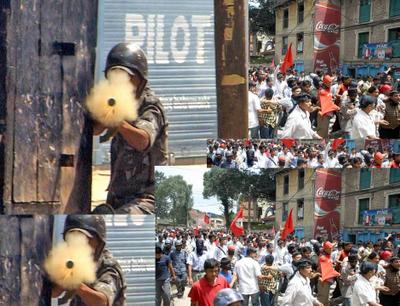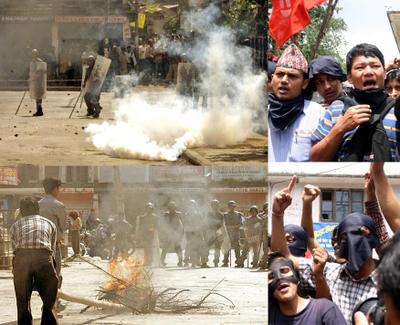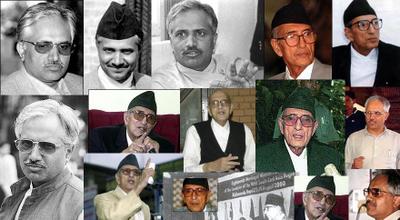
Prachanda wants to talk. The king wants to talk. But the democrats are rebuffing both. This has to be seen as the new found confidence of a group that has been in disarray for long.
It is remarkable that the Nepali Congress has made the changes it has in its documents. The NC otherwise has been a sloth.
Now only if they could "cure" Girija!
In The News
- Nepal Political Party Opens Convention Guardian Unlimited, UK ...... ``If the king does not need political parties, then political partied do not need the king either,'' said Madhav Nepal...... ``It has been proven that even if the king is left with little power or role, democracy will never be safe,'' said Narhari Acharya, a candidate for the party's presidency......The tug-of-war within the party has been blamed for slowing down the campaign to restore democracy ..... Koirala has also been accused of nepotism within party ranks, and many of his former supporters have quit to join rival parties.
- Nepal PM ready for talks with parties Times of India, India ...... Admitting that the gap between him and Nepal's political parties has "widened" ...... "The political parties must possess crystal-clear views on four issues- terrorism, good governance and corruption, politicisation in bureaucracy and financial discipline - for talks," he said adding "if they make clear views on these issues then there will be room for dialogue"........ "there have been squabbles between the political parties and the King as between husband and wife, which is natural when we are too close"....... Admitting that some of the Maoists' demands were "justifiable," he said the 21 point programme announced by him attempted to address the issues raised by the guerillas.
- Nepal king's offer of dialogue rebuffed Radio Australia, Australia ....... The leaders of two parties, the Nepali Congress and Nepal Communist Party-United Marxist and Leninist say they are no longer committed to having a monarchy in the Himalayan country.......
- Nepali Congress to choose new leadership: NewKerala.com, India ....... four-day convention to choose a new leadership...... four-time former prime minister Girija Prasad Koirala ..... The differences between the two leaders reached a head in May 2002 when Deuba, who was then prime minister, ignored his party's advice not to extend a state of emergency and asked for the dissolution of parliament....... the octogenarian leader who rules over his party with an iron fist had the party statutes changed so that he could continue as chief for another term..... the party will severe its ties with monarchy.
- Debating on constitutional monarchy Kathmandu Post, Nepal ..... Constitutional monarchy is practically dead. It is no longer a burning issue....... The main political parties are showing strong signs of vacillation on the theory and practice of monarchy. They go one step forward to threaten it but move two steps back to retract or reform it. ...... alternatives of constitutional monarchy and monarchical constitution..... Till now, every one is playing a soft and relatively safe game. The political parties and the palace have not pushed each other to the wall. The parties are free to agitate peacefully and express their views in public. The palace is not hard on them in their oppositional activities....... Neither the Maoists nor the government security forces are in a decisive and desperate situation. Even a casualty over a hundred lives in Kalikot conflagration has not made any visible difference to their strategic or military strength, let alone their thinking pattern. They are run-ning their business as usual...... the days of soft decisions are over. What we look forward to is the time of hard choices especially when a new Krishna (Pahadi) cult of republicanism is emerging on the horizon.
- Beware parties Kantipur ...... there is news report in the Maoist web-site as well as rumors that the king may reinstate the dissolved parliament ..... A ploy to divide the 7-party coalition's struggle for democracy and continue to rule by discrediting the leaders and political parties by making them agree to another compromise....... all political activities should be transparent..... the people, political parties and civil societies demanded reinstatement of the dissolved parliament in order to democratize Nepal with a representative government to reform the constitution by the two thirds majority to pave the way to evolve a new constitution through an elected constitutional assembly, to put all security structures under the parliament, to dissolve all supra or extra constitutional bodies and to declare a cease-fire in order to have successful dialogue with the Maoists........ mainstream the Maoists with the formation of an interim government ...... I hope that the parties will act wisely and refrain from shady deals with regressive institutions.
- Dirty politics for NGO purification Kantipur ...... Because of the diversity of NGO constituencies, sizes, strategies, structure, ideologies, specialization, sources of funding, agenda and power, it is not possible to describe an average NGO. They may be religious, secular or affiliated with political and social groups; be funded by businesses, foundations, private citizens and governments; specialize in a technical field or operate for multiple purposes......... The government has regarded very few human rights NGOs that have mortgaged their conscience by overtly supporting the regime in the wake of February 1 move as non-partisan, nonsectarian and non-political......... The promulgation of the ordinance and the code of conduct in pipeline are basically directed towards curbing front-line human rights NGOs which have been enormously critical to the new regime. Thus, the exercise to introduce the Ordinance is politically motivated and the conspiracy has been calculated behind the curtain in a clandestine manner......... concerns over the dissenting political behavior of NGOs...... NGOs can not function independently except for the GONGOs (government sponsored non-governmental organizations) in an undemocratic and brutal society. Political freedom is a prerequisite to operate any voluntary sector without state's dictation and encroachment to its jurisdiction....... Another major concern of the government which is circuitously reflected in the Ordinance is the question of the 'covert' objectives or agendas which are perceived to have negative political consequences or are in contradiction to the regime's new political doctrine.
- Guerrillas abduct 130 civilians in mid-western Nepal Xinhua, China
- Guerrillas abduct 200 civilians in far-western Nepal
People's Daily Online - UN alarmed by disappearances in Nepal conflict Reuters AlertNet, UK ...... "The problem of disappearances continues to be a serious concern," Ian Martin ......The condition of 888 people reported to have disappeared in state custody has not been made public so far," the commission said in a statement. There was no information about another 98 people reported kidnapped by the rebels ...... civil rights groups were being harassed for trying to find missing people. ...... Last year, the United Nations Group on Enforced or Involuntary Disappearances urged the army to keep a national register of detainees and stop incommunicado detentions...... "There is still much to be done on implementing those recommendations"
- NEPAL: Focus on rural development in Maoist areas Reuters AlertNet, UK ...... "What choice do we have? The Maoists control 80 percent of the district and say they have the authority to know all about our activities" ...... a part of the country characterised by inadequate health facilities, water shortages, poor agricultural production, low literacy rates and widespread discrimination against women....... The NGOs are tired of Maoist demands to pay 'donations' to the movement and demands that they register with the 'people's government' for permission to launch and maintain their projects...... Several volunteers from remote community-based organisations explained that aid and development work can continue as long as it falls within strict parameters imposed by the Maoists: NGOs must be transparent and honest and must not be funded by Washington or the Nepali government........ Programmes related to women's development, irrigation, agriculture, health and water, funded by the UK's Department for International Development (DfID), Germany's GTZ and the World Bank, are all running smoothly....... "We show them all our budget expenses and they also ask local villagers if they are satisfied with our work" ...... Often NGO staff are compelled to pay a monthly 'income tax' of 10 percent of their total salary. The danger of being forced to do this is that those who pay are then vulnerable to interrogation and arrest by security personnel...... there is no consistency amongst rebel leaders..... "There are different sets of Maoist rules and policies in every VDC. The senior leaders have given the VDC Maoist in charge, full freedom to introduce any policy to suit their interests" ...... The international agencies, especially the UN, have to really put strong pressure on the top Maoist leadership to ensure that the junior cadres allow us to work without any threats or pressure....... Recently, in the remote Jaljala VDC, villagers took on the rebels after a local NGO was warned to stop work on an income generation project. They told the rebels that they would be prepared to fight against them if the project closed down........ "The Maoists agreed not to create any more obstacles for the project and it is now running successfully.... The people will do anything to protect such a project that is really helping them"
- Rebels torch bus, abduct 202 people in Nepal
Daily Times - Guerrillas torch buses, abduct security men in eastern Nepal
People's Daily Online - Parties not deterred by King’s remarks: Nepal Kantipur Online, Nepal .... called on the civil society and media to take the King’s remarks seriously and oppose it ..... “Previously, ministers used to give threats to political parties and now the chairman of the council of ministers has started doing the same”....“We will launch door to door visits at the local level to encourage the people to join the protest”
- ‘Go for constituent assembly’
Kathmandu Post On the eve of the 11th General Convention of Nepali Congress, senior leaders of the seven-party alliance on Monday urged the party to opt for a clear forward-looking political agenda that would allow the party to go for constituent assembly....... Standing Committee member of CPN-UML Jhalanath Khanal, NC (D) central committee member Bimalendra Nidhi and General Secretary of Nepal Sadbhavana Party (Anandidevi) Hridayesh Tripathi said that since the existing national challenges were not possible to be addressed under prevailing political structure, NC should internalize the political agenda of constituent assembly in its statute. - NC breaks with history omitting constitutional monarchy from its party statute ..... finalized a policy paper that officially cuts off the party's relations with the country's 237-year-old institution, the monarchy..... delete "constitutional monarchy" from Clause 2 of the party statute .... The party has also amended its statute which earlier mentioned constitutional monarchy as its pride. Now the statute mentions constitutional monarchy as a past glory....... The NC decision, along with a decision by CPN-UML last week to go for democratic republic, marks the beginning of a new polarization toward republicanism in the country.......Senior NC leader Shailaja Acharya and Nara Hari Acharya wrote notes of dissent. Shailaja said she was absolutely against the idea of omitting constitutional monarchy from the party statute. "I am not in favor of deviating from our decades old middle-path," Acharya said. "It will be counterproductive not only for the party but also for the entire nation." She demanded her statement be recorded in the party and walked out of the meeting........ She also argued that dropping monarchy from the party statute meant declaring the present constitution dead....... Narahari Acharya wrote a dissenting note for a different reason. He argued that the party should have decided unambiguously in favor of establishing supremacy of parliament under people's sovereignty........ also endorsed a number of agendas including putting the army under a representative institution, socio-economic reforms and constituent assembly elections for making people sovereign in the real sense....... The party also urged Maoist rebels for clear commitment to lay down arms before the constituent assembly elections. It also urged the king to let the people decide what sort of role they want for the monarch........ More than 95 percent of the 1464 delegates (seven each from 205 constituencies and central committee members)....... the central president can nominate up to 30 representatives to the convention but he has not nominated anyone as of yet........ Girija Prasad Koirala, will contest the party presidency for a third consecutive term, though he has not yet announced his candidacy. Narahari Acharya has already announced his candidacy for the party's top post........ Late BP Koirala's youngest son, Dr Sashanka Koirala, has announced his candidacy for central committee member........ The CWC meeting has not proposed any significant changes in the party's organizational structure that gives enormous power to the party's central president......... Speaker Tara Nath Ranabhat has urged the party to take initiatives for party unity, ensure international democracy, restore collective leadership and take initiative to pave an active role for former prime minister KP Bhattarai in the party....... Existing Clause 2 Based on the principles of nationalism, democracy and socialism and within the framework of constitutional monarchy, multiparty system and parliamentary form of government, the NC aspires to achieve socio-political and economic development of the country by creating a just and dynamic society. Amended Clause 2 Based on the principles of nationalism, democracy and socialism and within the framework of multiparty system and parliamentary form of government, the NC aspires to achieve socio-political and economic development of the country and create a dynamic and just society by restructuring the state and implementing the concept of inclusive democracy










